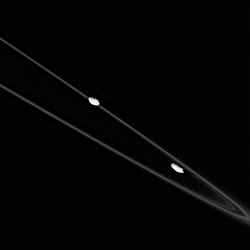
Shepherd moons, Prometheus and Pandora. Image credit: NASA/JPL/SSI Click to enlarge
This spectacular image shows Prometheus (at left) and Pandora (at right), with their flock of icy ring particles (the F ring) between them. Pandora is exterior to the ring, and closer to the spacecraft here. Each of the shepherd satellites has an unusual shape, with a few craters clearly visible.
The effect of Prometheus (102 kilometers, or 63 miles across) on the F ring is visible as it pulls material out of the ring when it is farthest from Saturn in its orbit. Pandora is 84 kilometers (52 miles) across.
The image was taken in polarized green light with the Cassini spacecraft narrow-angle camera on Oct. 29, 2005, at a distance of approximately 459,000 kilometers (285,000 miles) from Pandora and 483,500 kilometers (300,500 miles) from Prometheus. The image scale is 3 kilometers (2 miles) per pixel on Pandora and 3 kilometers (2 miles) per pixel on Prometheus. The view was acquired from about a third of a degree below the ringplane.
The Cassini-Huygens mission is a cooperative project of NASA, the European Space Agency and the Italian Space Agency. The Jet Propulsion Laboratory, a division of the California Institute of Technology in Pasadena, manages the mission for NASA’s Science Mission Directorate, Washington, D.C. The Cassini orbiter and its two onboard cameras were designed, developed and assembled at JPL. The imaging operations center is based at the Space Science Institute in Boulder, Colo.
For more information about the Cassini-Huygens mission visit http://saturn.jpl.nasa.gov . The Cassini imaging team homepage is at http://ciclops.org .
Original Source: NASA/JPL/SSI News Release
